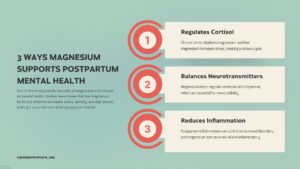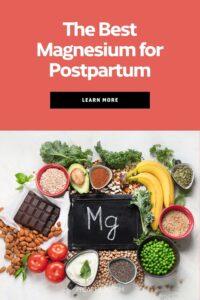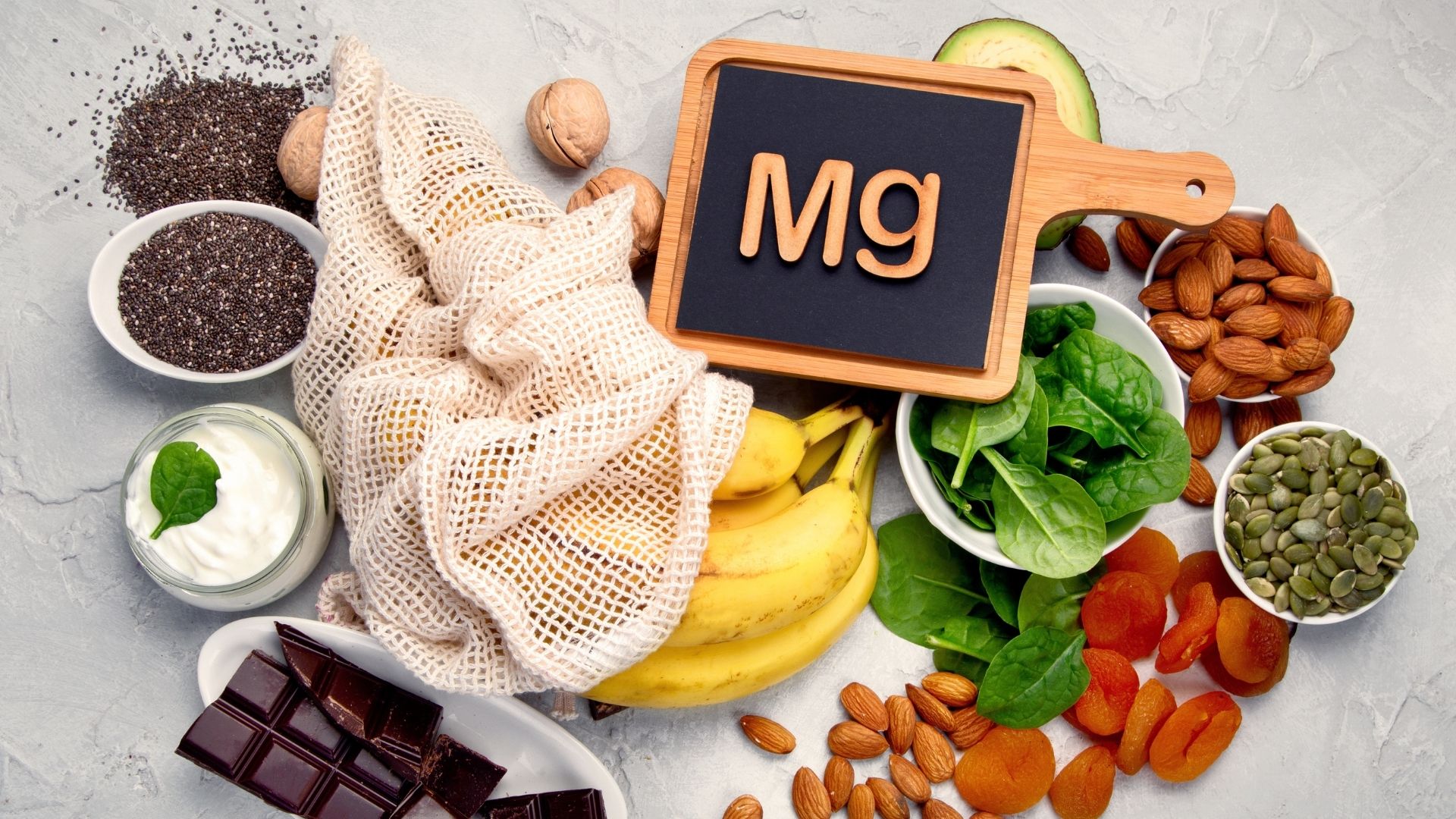Low magnesium postpartum is a common yet often overlooked issue that can significantly impact a new mother’s recovery. While much of the focus during postpartum is on healing from childbirth and adjusting to life with a newborn, many women experience unexpected symptoms like extreme fatigue, mood swings, poor sleep, muscle cramps, and brain fog—all of which can be linked to magnesium deficiency.
Magnesium is one of the most essential yet under appreciated minerals for postpartum recovery. It plays a critical role in hormone balance, energy production, nervous system regulation, and mental health, making it vital for both new moms and their babies.
Ensuring adequate magnesium levels can help support a smoother recovery, improve mood, and promote overall well-being in the months following childbirth.
In this blog post, we’ll explore:
- Why magnesium is important during the postpartum period
- The symptoms of low magnesium postpartum
- How magnesium supports mental health, breastfeeding, and recovery
- The best forms of magnesium to take postpartum
- How to safely supplement magnesium while breastfeeding
If you’ve been wondering, “Can I take magnesium postpartum?”, the short answer is yes—but not all forms are equally effective. Keep reading to learn how to optimize your magnesium levels naturally and feel your best after birth.
Why Magnesium Matters in the Postpartum Period
Magnesium is involved in over 300 biochemical reactions in the body, impacting everything from muscle function and nerve signaling to hormone balance and mood regulation. During pregnancy, magnesium levels often become depleted due to the increased demands of supporting fetal development, and postpartum recovery further strains the body’s magnesium stores.
Unfortunately, many women enter postpartum already deficient in magnesium, which can lead to a cascade of symptoms that are often mistaken for “just part of new motherhood.”
Some key reasons why magnesium is essential postpartum:
- Hormone regulation – Helps balance estrogen and progesterone, which fluctuate dramatically after birth.
- Stress reduction – Magnesium calms the nervous system, reducing stress and postpartum anxiety.
- Muscle and nerve function – Prevents muscle cramps, tension, and restless legs, which are common postpartum.
- Sleep support – Magnesium promotes deep, restful sleep, which is especially important for exhausted new moms.
- Bone health – Works alongside calcium and vitamin D to support bone density during lactation.
- Milk production – May help relax the milk ducts, allowing for better milk flow while breastfeeding.
Since magnesium is rapidly depleted through stress, breastfeeding, and poor diet, it’s important to actively replenish it postpartum.
Low Magnesium Symptoms: Are You Deficient?
It’s estimated that nearly 50% of the population is magnesium deficient, and postpartum women are especially at risk. Low magnesium levels can manifest in a variety of ways, many of which overlap with common postpartum symptoms.
Signs of Low Magnesium Postpartum:
- Chronic fatigue, even after rest
- Increased anxiety, irritability, or postpartum depression symptoms
- Brain fog, difficulty concentrating
- Muscle cramps, twitches, or tension
- Trouble falling or staying asleep
- Heart palpitations or rapid heartbeat
- Headaches or migraines
- Low energy and sluggish metabolism
- Digestive issues, including constipation
Many of these symptoms are often dismissed as “just part of having a newborn,” but if you’re experiencing several of these signs, low magnesium could be a contributing factor.
Magnesium and Mental Health: Can It Help Postpartum Depression and Anxiety?
One of the most powerful benefits of magnesium is its impact on mental health. Studies have shown that low magnesium levels are linked to increased stress, anxiety, and depression, making it a crucial mineral for postpartum women.
How Magnesium Supports Postpartum Mental Health:
- Regulates cortisol (stress hormone) – Chronic stress depletes magnesium, and low magnesium increases stress, creating a vicious cycle.
- Balances neurotransmitters – Magnesium helps regulate serotonin and dopamine, which are essential for mood stability.
- Reduces inflammation – Postpartum inflammation can contribute to mood disorders, and magnesium acts as a natural anti-inflammatory.
In fact, research suggests that women with postpartum depression often have lower magnesium levels than those without. By replenishing magnesium, many moms experience improved mood, better sleep, and reduced stress.

The Best Magnesium for Postpartum: Which Type Should You Take?
If you’ve been researching magnesium supplements, you’ve probably seen multiple forms—magnesium citrate, magnesium glycinate, magnesium oxide, and more. Not all of these forms are equally effective, especially for postpartum women.
Best Magnesium for Postpartum:
- Magnesium Glycinate – The best option for stress relief, relaxation, and sleep. Gentle on the stomach and highly absorbable.
- Magnesium Citrate – Supports digestion and helps relieve postpartum constipation, but may cause loose stools in some women.
- Magnesium Malate – Great for energy production and muscle recovery. Ideal for moms experiencing fatigue or muscle tension.
- Magnesium L-Threonate – Known for improving brain function and reducing brain fog. A good option for mental clarity.
The ideal postpartum magnesium supplement will combine magnesium glycinate with other forms for comprehensive support.
Keep in mind, this is not medical advice. To give you personalized dosing, we would need to draw your labs! Book a call with us to learn more.
How to Maintain Healthy Magnesium Levels Postpartum
If you’re wondering “Can I take magnesium postpartum?”, the answer is yes—but it’s best to combine dietary sources with high-quality supplements.
Postpartum Magnesium Protocol: How to Replenish Your Levels
- Eat Magnesium-Rich Foods
- Dark leafy greens (spinach, Swiss chard)
- Nuts & seeds (pumpkin seeds, almonds)
- Avocados
- Bananas
- Dark chocolate
- Whole grains (quinoa, brown rice)
- Take a High-Quality Magnesium Supplement
- For stress & sleep: Magnesium glycinate (300-400 mg/day)
- For digestion: Magnesium citrate (as needed)
- For brain function: Magnesium L-threonate
- Hydrate & Support Electrolytes
- Pair magnesium with electrolytes like sodium and potassium for better absorption.
- Avoid Magnesium Depleters
- Limit caffeine, alcohol, processed foods, and excessive sugar, which can drain magnesium stores.
- Work with a Postpartum Specialist
- At Postpartum Care USA, we help moms identify nutrient deficiencies through lab testing and create personalized postpartum plans.
Is Magnesium Safe for Breastfeeding?
Many new moms wonder, “Can I take magnesium postpartum while breastfeeding?” The answer is yes—magnesium is safe for breastfeeding moms and may even help support lactation.
Magnesium won’t directly increase milk supply, but since it helps with stress reduction and relaxation, it may improve milk flow by relaxing the milk ducts. This makes magnesium especially helpful for moms struggling with letdown reflex issues.
As long as you stay within the recommended daily intake of 320 mg per day, magnesium is considered safe while breastfeeding.
Magnesium is Essential for Postpartum Recovery
Magnesium is one of the most important but overlooked nutrients for postpartum women. Whether you’re struggling with fatigue, mood swings, muscle tension, or sleep disturbances, increasing your magnesium levels can help restore balance and improve your overall well-being.
Key Takeaways:
- Many postpartum women are magnesium deficient due to pregnancy depletion and breastfeeding.
- Low magnesium symptoms include fatigue, anxiety, brain fog, and poor sleep.
- The best magnesium for postpartum is magnesium glycinate, which is gentle on the stomach and supports relaxation.
- Magnesium is safe for breastfeeding and may even help with milk flow.
- A combination of food sources and supplements is the best way to replenish postpartum magnesium levels.
If you’re experiencing postpartum symptoms and suspect a magnesium deficiency, consider testing your levels and incorporating a high-quality magnesium supplement into your routine.
Want to learn more about postpartum nutrition? Schedule a consultation with Postpartum Care USA to get a personalized postpartum health plan and feel like yourself again.
Pin This for Later:



Postnatal Depletion
Meet the Team
Our Services
Supplements
A virtual healthcare clinic that helps postpartum mamas recover from postnatal depletion syndrome with a holistic approach.

Get in touch